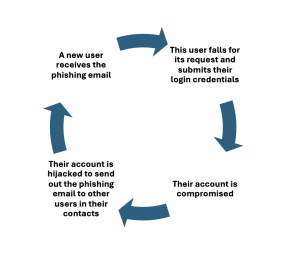
Our Loyola community is no stranger to scams and phishing emails circulating in our digital space. It would seem recently, however, that a noticeable uptick in compromised accounts disseminating phishing scams has occurred. One such phishing email claims that the termination of a user’s account was initiated, and to prevent it, one must submit their login credentials into a form. Many users report receiving multiple emails of this scam from the same or different LUC email addresses. The proliferation of this scam is due to a cycle of unaware users falling for the scam, their accounts being compromised, and those accounts in turn being hijacked to further distribute the scam.

We highly encourage the reporting of phishing emails that originated from Loyola accounts. Doing so helps us to reset accounts and contain the spread of phishing scams. You can report a phishing scam via
To protect yourself against phishing, follow these basic guidelines:
- Be wary of emails asking for confidential information, especially passwords or anything of a financial nature. Legitimate organizations will never request sensitive information via email.
- Don’t allow yourself to be pressured into providing sensitive information. Phishers like to use scare tactics and may threaten to disable an account or delay services until you update certain information. Be sure to contact the merchant via another method to confirm the authenticity of their request.
- Watch out for generic-looking requests for information. Fraudulent emails are often not personalized, while authentic emails from your bank often reference an account you have with them.
- Never submit confidential information via forms embedded within email messages.
- Never use links in an email to connect to a website. Instead, open a new browser window and type the URL directly into the address bar.
By adopting these practices, we can help keep our campus community safe from cyber threats.
Thank you for your attention and commitment to cybersecurity!
